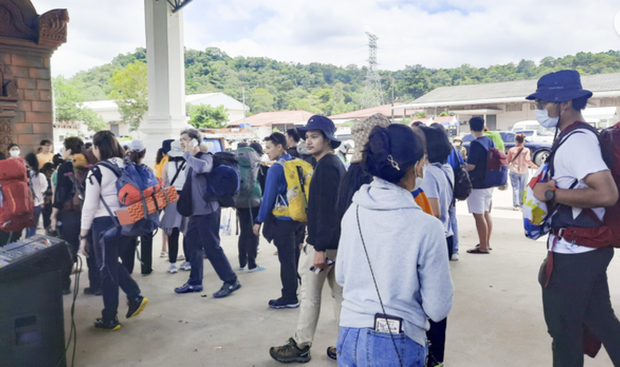Thailand’s aging population will bring more job possibilities for young migrant workers from Laos in the coming years, a senior Thai labor official said at a recent conference on migration in Bangkok.
An estimated 230,000 Laotians already do domestic work, construction, and farming in Thailand, according to Thailand’s Ministry of Labor. They are among 2.6 million migrant workers in the country – most of whom come from Southeast Asia, the ministry said.
But Thai companies have been asking the government over the last two years for an additional 400,000 migrant workers to serve a growing economy, said Decha Pruekphathanarak, the deputy permanent secretary at the ministry.
“We lack laborers, and the only way to fill the gap is to import workers from nearby countries,” he said at the Dec. 17 conference organized by the International Organization for Migration, or IOM.
Thailand’s birth rate has fallen over the last decade. At the same time, Laos’ economy continues to struggle with inflation, a devalued currency, and low pay, leaving its young population without much opportunity.
Teenagers are increasingly leaving high school before graduation to find work in Thailand, South Korea, and elsewhere, local officials in two Lao provinces told Radio Free Asia last week.
In South Korea, Laotians can make about 1 million kip (about US$52) per day working in factories or on farms – about what they would earn in a month at home. In Thailand, they can expect a monthly salary of around 10,000 baht (about US$280).
In northern Laos’ Xayaburi Province, which borders Thailand, some 1,039 high school students out of 5,632 in Pak Lay district dropped out during the 2022-2023 academic year to find work, according to an education official who, like other sources in this report, requested anonymity for safety reasons.
“Many of us don’t want to waste our time studying because the education in this country doesn’t respond to our needs. It won’t improve our living conditions,” one Xayaburi teenager told RFA. “It’s now so difficult to live our lives in Laos that we decide to go to other countries where wages are higher.”
‘The rest have fled’
In Champassak province in southern Laos, the situation is similar, one older father said. Many villages in the province’s Khong district are empty of teenagers and young adults, he said.
“They go over there to make ends meet, so they can have something to eat and money to live on,” the father said.
Laos and Thailand have agreements in place allowing for work visas and mandating a monthly minimum wage. However, migrants must be at least 18 years old to work legally in Thailand.
That means that younger Laotians crossing into Thailand are working illegally, are often being paid unfair wages, and are vulnerable to human trafficking, a Lao labor official said.
“We often try to visit them at their homes, villages, and schools in an effort to convince them to continue their education,” the labor official said. “But they’re not there. Only old people and children have stayed home. The rest have fled to Thailand.”
Thailand should consider amending agreements with neighboring countries to lower the minimum age to obtain a work visa to 15, said Associate Professor Teeranong Sakulsri at Thailand’s Mahidol University.
That would allow for more protections for the younger workers, she said at last month’s IOM conference.
Bringing in more Lao workers to Thailand would also be a good fit culturally, according to Aphichat Chamratrithirong, an adviser for Mahidol’s Institute for Population and Social Research.
“Lao workers and Thai employers can get along well because they share many similarities,” he said, citing food and language as two prime examples. “In border provinces, they seem to be cousins.”







